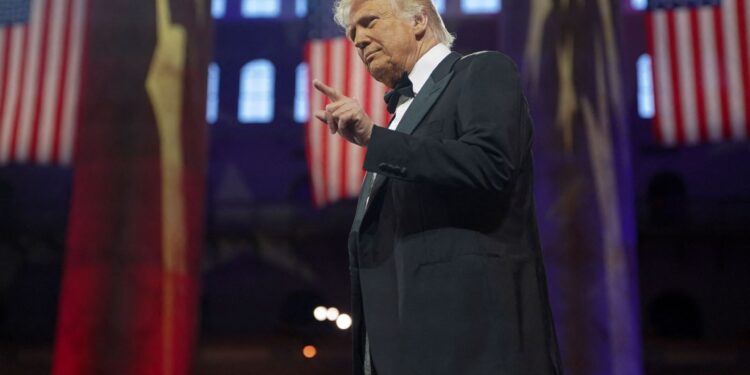US President Donald Trump announced yesterday, Wednesday, a temporary suspension of 90 days of the new customs fees that were recently imposed on a group of allied countries of the United States, including European and Asian countries.
The decision came in a minute moment in which global markets are witnessing a state of sharp fluctuation, amid increasing fears of the entry of the American economy in a stagnation, and the increasing international criticism of the protection approach adopted by the American administration.
Although this comment was relatively welcomed by the markets and some western capitals, China remained explicitly excluded from this decision, but rather an additional increase in customs duties imposed on its exports, reaching 125%.
This discrimination in dealing has raised deep questions about the real goals behind this commercial maneuver, and whether it is a prelude to a broader settlement or just a tactical step to gain time and reduce internal and international pressures.
This development comes in the context of an ongoing escalation between Washington and Beijing since the beginning of the second term of President Trump, where the commercial file between the two economic powers is witnessing an increasing tension, its impact extends to global supply chains and financial markets, and re-draws the features of the global geo-economic scene.
Reasons for the decision .. possible backgrounds and motives
President Trump’s decision to suspend customs duties came at a sensitive timing, which raised questions about the motives behind this sudden shift in American commercial policy.
While the decision is considered a partial calm, the data indicate that its causes go beyond direct economic accounts, to reflect a complex interference between internal pressures, international reactions, and negotiation tactics with commercial opponents, led by China.
- The fluctuation of markets and economic fears
The previously imposed customs duties led to major disturbances in the market, as the Dow Jones industrial index witnessed severe declines. As Reuters reported, the markets prevailed in a state of “selling everything that is American”, an expression that was repeated during previous financial crises, which raised fears of imminent economic stagnation.
- Diplomatic pressures and talks of the Seven Group
The Italian Economy Minister, Gencarlo Giogeletti, told Reuters that the Group of Seven Finance, with the exception of the United States, discussed a collective response to US measures, adding that “the suspension is a positive step that would open the way for a constructive dialogue.”
This international pressure is probably played in the White House decision to temporarily freeze the fees, according to American media.
- Strategic focus on China
The Wall Street Journal indicated that the US administration seeks, by raising customs duties on Chinese imports, to 125% to address what it considers chronic imbalances in the trade balance with Beijing, in addition to violations of intellectual property rights.
This strategy reflects a tendency to exercise the utmost pressure on China, in exchange for calming tension with other commercial partners.
Immediate reactions in the markets
The commentary announced a strong increase in the American market, as the Standard & Poor’s 500 index increased by 9.5%, while the NASDAC index rose by 12.2%, in one of the largest gains since World War II, according to Wall Street Journal.
This boom reflects the optimism of investors that the temporary retreat from escalation may contribute to avoiding economic stagnation.
On the other hand, the additional fees on China ignited a new confrontation. Reuters quoted Chinese sources as saying that Beijing raised its fees to 84% on a number of American products, and also put American companies on the “blacklist”.
“We are facing a long -term confrontation, and each party is betting on the economic party economically.”
International reactions
The next German advisor, Fredchich Mertz, praised what he described “the effectiveness of the unified position of Europe in influencing Washington’s decisions,” calling for a trade -free trade agreement between the European Union and the United States.
He said in a statement to “Reuters”: “We need to build long -term strategic relationships with Washington, which go beyond circumstantial confrontations.”
In Asia, the Japanese and South Korean markets witnessed a remarkable increase after the announcement, in light of the optimism that the comment will give an opportunity for deeper negotiations.
“The markets are looking at the comment as a tactical step, not a fundamental change in Trump’s orientation,” Hirosho Cato, chief analyst at Mizuho, told Bloomberg.
Possible future repercussions
Although the decision to suspend customs duties was initially welcomed in some economic and international circles, its actual effects will not be fully clear only during the coming weeks and months. The global trade scene is still fragile, tension with China is escalating.
Based on the current data, this decision is expected to have a set of economic and geopolitical repercussions, some of which are short -term, and the other may extend to reshape the balance of power in international trade.
- Economic uncertaintyDespite the temporary satisfaction, the continued escalation with China may lead to high prices within the United States and slow economic growth, according to Wall Street Journal analysis.
- Global supply chains disorderAmerican companies may have to search for alternatives to supply outside China, which requires huge investments and restructuring that may take years, according to Reuters analysis.
- Rising diplomatic tensionChina’s exclusion from the comment may complicate future negotiations, and the disputes can be expanded to include other areas such as technology and energy.
It may reflect Trump’s move to suspend customs duties for a period of 90 days a tactical shift in American commercial policy, driven by market pressure and sensitive diplomatic interactions.
While the comment opens the door to negotiations with some partners, the escalation with China remains a central tension factor that may have long -term repercussions on global economic stability.
Observers are waiting for whether this truce is the beginning of a comprehensive solution or just a temporary truce in a long trade war.



